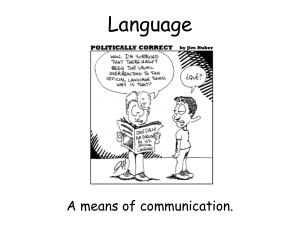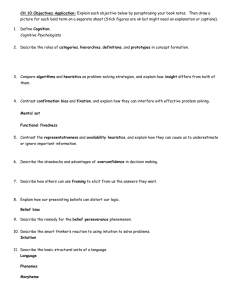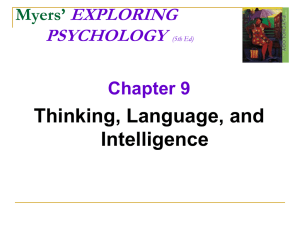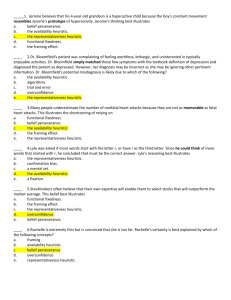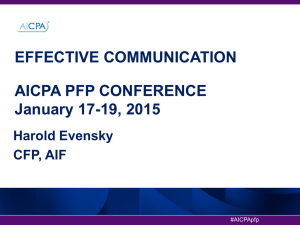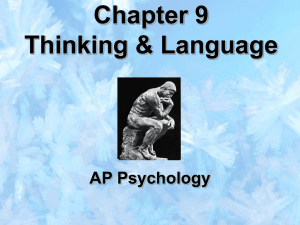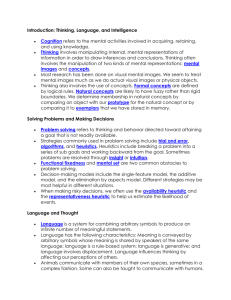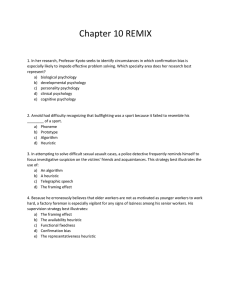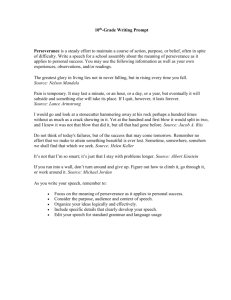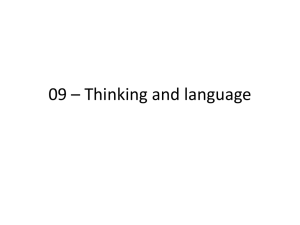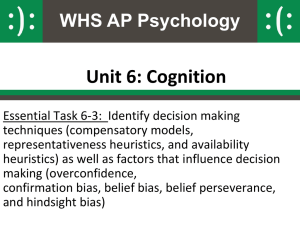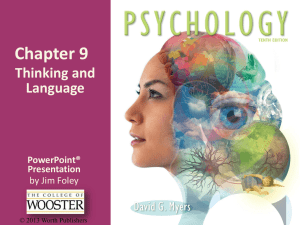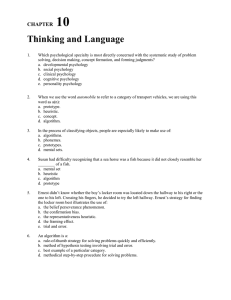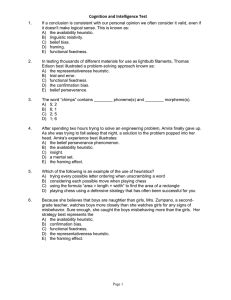AP Psychology: Chapter 9 - Thinking and Language
advertisement
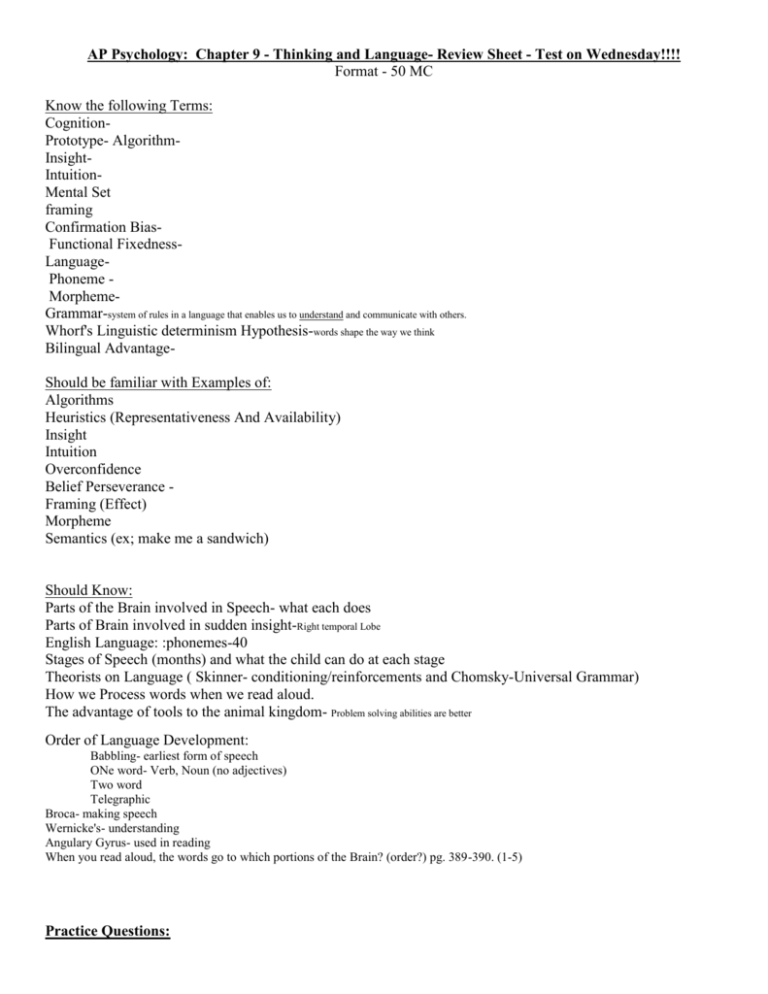
AP Psychology: Chapter 9 - Thinking and Language- Review Sheet - Test on Wednesday!!!! Format - 50 MC Know the following Terms: CognitionPrototype- AlgorithmInsightIntuitionMental Set framing Confirmation BiasFunctional FixednessLanguagePhoneme MorphemeGrammar-system of rules in a language that enables us to understand and communicate with others. Whorf's Linguistic determinism Hypothesis-words shape the way we think Bilingual AdvantageShould be familiar with Examples of: Algorithms Heuristics (Representativeness And Availability) Insight Intuition Overconfidence Belief Perseverance Framing (Effect) Morpheme Semantics (ex; make me a sandwich) Should Know: Parts of the Brain involved in Speech- what each does Parts of Brain involved in sudden insight-Right temporal Lobe English Language: :phonemes-40 Stages of Speech (months) and what the child can do at each stage Theorists on Language ( Skinner- conditioning/reinforcements and Chomsky-Universal Grammar) How we Process words when we read aloud. The advantage of tools to the animal kingdom- Problem solving abilities are better Order of Language Development: Babbling- earliest form of speech ONe word- Verb, Noun (no adjectives) Two word Telegraphic Broca- making speech Wernicke's- understanding Angulary Gyrus- used in reading When you read aloud, the words go to which portions of the Brain? (order?) pg. 389-390. (1-5) Practice Questions: 1. "Chair", "Freedom", and "ball" are all a. Phonemes b. Heuristics c. Concepts d. Telegraphic Utterances e. Prototypes 2. People are more concerned about a medical procedure when told it has a 10 percent death rate than they are when told it has a 90 percent survival rate. This is because of a. belief perseverance b. insight c. intuition d. framing e. confirmation bias 3. Which of the following illustrates a heuristic? a. Calculating the area of a rectangle by multiplying the length time the width. b. Recalling published reports of corporate fraud to estimate how much fraud occurs in American business. c. Looking in each room of your home to find your sleeping cat. d. Following a new recipe to bake a cake for your friend. e. Trying every key on your mom's key ring until you find the one that unlocks the seldom-used store-room in the basement. 4. Which of the following represents a prototype for the concept indicated in parentheses? a. A whale (mammal) b. An ostrich (bird) c. A beanbag chair (chair) d. An igloo (house) e. A golden retriever (dog) 5. Who proposed the idea that language development could be explained with the principles of learning? a. B. F. Skinner b. Noam Chomsky c. Steven Pinker d. Benjamin Lee Whorf e. Paul Broca 6. The inability to see a problem from a fresh perspective is called a. confirmation bias b. insight c. representativeness d. fixation e. availability 7. In English, we know to put adjectives before nouns because of a. semantics b. syntax c. statistical learning d. algorithms e. practice during the babbling stage. 8. Mental rehearsal can improve athletic performance because of the effectiveness of thinking in a. images b. morphemes c. telegraphic speech d. semantics e. Phonemes 9. Phonemes are a. units of meaning in a language. b. a form of syntax. c. the basis of grammar d. units of sound in a language. e. a form of telegraphic speech. 10. People often underestimate the amount of time it will take to complete a project because of a. belief perseverance b. framing c. intuition d. the availability heuristic e. overconfidence 11. German students unfamiliar with American geography guessed that San Diego was larger than San Antonio more frequently than American students made this correct identification. The German students were effectively using a. Framing b. the representativeness heuristic c. intuition d. belief perseverance e. mental set 12. Which of the following demonstrates the representativeness heuristic? a. Deciding that a new kid in school is a nerd because he look like a nerd. b. Fearing air travel because of memories of plane crashes. c. Checking in every drawer to find some matches because matches are usually in drawers. d. Having the solution to a word problem pop into your head because you have just successfully solved a similar problem. e. Applying for jobs in several local grocery stores because your best friend just got a job in a grocery store. 13. Benjamin Lee Whorf's linguistic determinism hypothesis relates to the a. influence thinking has on language. b. influence language has on thinking. c. role of the language acquisition device. d. importance of critical periods in language development. e. development of language in nonhuman animals. 14. Noam Chomsky believe that all we need to acquire language is a. exposure to language in early childhood. b. instruction in grammar c. reinforcement for babbling and other early verbal behaviors. d. imitation and drill e. linguistic determinism.
